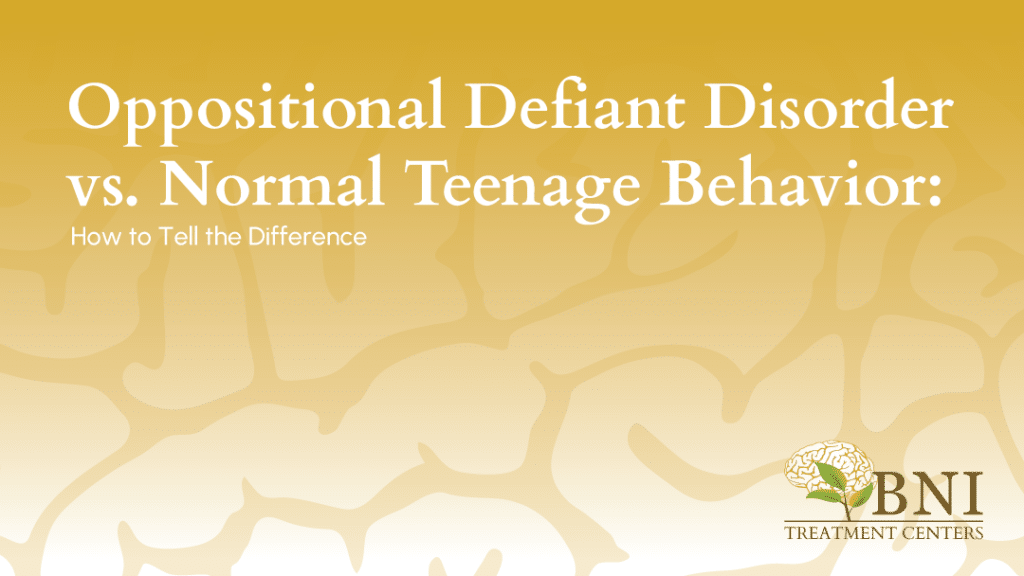
Stereotypical teen behavior involves mood swings, disobeying adults, and pushing boundaries – but what happens when it becomes more than that?
Sometimes, this behavior is so severe that it significantly interferes with families’ relationships and lives. In these cases, there may be something greater at play: oppositional defiant disorder (ODD).
ODD impacts an estimated 3% to 5% of children, and by extension, their families. ODD is disruptive, frustrating, and even destructive for everyone involved. How do you know if it’s impacting your teen?
At BNI Treatment Centers, we work with teens who have many conditions, including ODD. We recognize it and help families heal from it. Let’s cover what you need to know about oppositional defiant disorder vs. normal teenage behavior so you can tell the difference.
What Are the Symptoms of ODD? How to Know if You Should Be Concerned
While some symptoms of ODD and normal adolescent behavior overlap, there are certain ones required to receive an ODD diagnosis. This criteria is laid out by the Diagnostic and Statistical Manual of Mental Disorders, Fifth Edition (DSM-5). Four of these symptoms must be present:
- Frequently losing their temper
- Easily annoyed
- Angry and resentful
- Arguing with authority figures
- Disobeying or challenging rules
- Deliberately irritating others
- Blaming others when they misbehave
- Vindictiveness
To receive an ODD diagnosis, this behavior needs to occur with people other than siblings. It also must happen at least once a week for 6 months. The behavior can’t take place exclusively due to outside forces, such as substance use or mood disorders. It must significantly impact the individual’s life and relationships. If these conditions are met, they may receive an oppositional defiant disorder diagnosis.
It’s important to remember that even if these symptoms sound familiar, conditions can only be diagnosed by mental health professionals. If you suspect your teen has undiagnosed ODD, the next step is to seek psychological testing.

Differences Between Oppositional Defiant Disorder and Normal Teen Behavior: Frequency and Intensity
The key to separating typical teen behavior and ODD is the frequency of symptoms. Every teen will experience some of the symptoms of ODD, but adolescents with ODD will have them often, and they may be more severe.
For example, a teen may have an angry, emotional outburst because their parents denied their request to visit friends. An adolescent with ODD may have a more extreme reaction in that situation. Small inconveniences happen frequently, and the first teen would likely move past it with mild annoyance. Individuals with ODD typically become disproportionately angry, even about things most would consider minor.
Treatment Options and Tips for Helping Your Teen With ODD
Parent management training has been effective for children with ODD, indicating parental involvement can have a significant impact on youth with the condition.
You can improve the situation by remaining calm and setting clear, healthy boundaries for your teen – but more than that, you should seek treatment for them. ODD is difficult for parents and teens to manage. Getting the help of an expert is best.
Family therapy could be beneficial, especially if the family’s dynamic is strained. It will also show your teen that you are serious about learning and potentially changing your behavior to better the situation. It will communicate that you do not think they’re “the only problem,” which can make them considerably more open to treatment.
Cognitive behavioral therapy (CBT) is a common and effective component of treatment for ODD. One review of 51 CBT effectiveness studies found that an average of 48% of individuals with ODD or conduct disorder achieved remission by the end of the study.
ODD also frequently occurs alongside other mental health conditions. In these cases, medication for comorbidities may be helpful, though this should always be at the discretion of a medical professional.

Oppositional Defiant Disorder Treatment in Los Angeles
ODD is difficult to manage on your own. If you believe your teen has this condition, contacting a mental health provider is the best course of action.
There is no exact protocol to treat ODD, as every adolescent is different. Your teen’s care should be individualized to address your family’s unique situation and the adolescent’s personal concerns. Comprehensive, customized behavioral health treatment is available and can help your family find peace and stability.
BNI Treatment Centers offers mental health care for teens in the Los Angeles area. Our facilities are owned and operated by psychiatrists and clinicians who tailor all treatment plans to clients. This also allows for quick changes when an aspect of treatment is ineffective, and the prescription and management of medications. Our experts work with teens with complex conditions every day and empower adolescents to live healthy, fulfilling lives. If your teen could benefit from our care, call us at (888) 522-1504.
BNI Treatment Centers: Science-based, evidence-backed, compassion-led.




